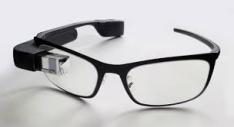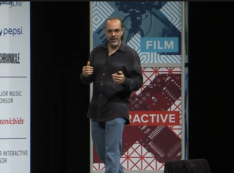Google’s mistake with Glass was letting people think it was finished article says project boss
The man charged with creating Google’s most imaginative projects has said the company’s biggest mistake with Google Glass was in promoting it too much and allowing people to think it was a finished product rather than a prototype.
Speaking on how failure has helped his team at Google X become better, captain of moonshots Astro Teller told an audience at SXSW of the Glass project, which has been shelved by the tech giant, he said: “We made one great decision and one not so great decision.
“The great decision was to do explorer program and get the technology out there being tested.
‘The thing we didn’t do well that was closer to a failure was we allowed, and sometimes encouraged, too much attention to the program. I wanted to say to the world this is an early prototype of something we think is exciting, where should we go from here?
“But we did things which encouraged people to think of it as finished product – we could have done a better job to stop that becoming as loud a conversation as it did.”
 Ultimately issues around privacy due to the camera attached to the headset, which saw the product banned from many public places in the US, saw the demise of the project in January.
Ultimately issues around privacy due to the camera attached to the headset, which saw the product banned from many public places in the US, saw the demise of the project in January.
However Teller described these as “rounding errors” from people adding: “If you really wanted to talk about privacy you would have have talked about where all these cameras are in your life.”
He described issues Google X has had with many products, from design software for architects to a new system to harness wind power which is more efficient than wind turbines.
He also talked abut the driverless car project, saying the company had cracked highway driving three years ago, and was doing 1,000 miles of road tests every day on other street types.
Describing how in 2012 some Google employees had been lent cars to test themselves on the highways on the commute to work Teller said while they had promised to pay attention and be vigilant “people do really stupid stuff when they’re driving, so you can imagine what they do when the car’s got that under control”.
“The assumption humans can be a reliable backup for the system is a fallacy,” he added. “Once people trust the system they trust it, our success was in itself a failure.”
The company has now taken the controls including steering wheel and brakes, out of the car.
Asked how small companies can become “moonshot factories” with limited budgets Teller said: “Failures are cheap if you do them first, failures are expensive if you do them at the end – that’s the entire point I’m trying to tell you.”
Alex Hayes in Austin






Probably the best job title and name i’ve heard in a while
User ID not verified.
Scott Galloway: “Google Glass is not a wearable. It’s a prophylactic ensuring you will not conceive a child as no one will get near you.”
https://www.youtube.com/watch?v=XCvwCcEP74Q&feature=youtu.be&t=10m45s
User ID not verified.
I never thought that glass was a finished product? I do think that with Tony Fadell, now heading up glass, ‘it’ will shine.
Surely it will be the technology and not a product that Google will finally polish?
Snow goggles, like Oakley’s Airwave are examples of great, handy wearable’s: https://www.youtube.com/watch?v=_gIvrVgLmWM – old news too.
Are we going to see a technology from Google, which can then be implemented into a variety of products:
– windscreens
– glasses
– masks (recreational and professional…)
– windows (home / office / defence)
– tables (kitchen / board room)
– animals. Yes, animals.
The list is endless, so many uses. Fun times.
User ID not verified.
Which just demonstrates that Google, for all the data and insights, has learned nothing and continues to ignore its audience in favour of itself.
Google Wave suffered exactly the same issue.
User ID not verified.